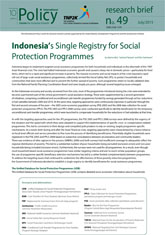Indonesia's Single Registry for Social Protection Programmes
IPC-TNP2K Research Brief No.49, July 2015
Author: Adama Bah, Suahasil Nazara and Elan Satriawan
Indonesia began to implement targeted social assistance programmes for both households and individuals in the aftermath of the 1997 Asian financial crisis. The crisis had halted Indonesia’s economic growth and caused a sharp rise in domestic prices—particularly for food items, which led to a rapid and significant increase in poverty. The massive economic and social impacts of the crisis required a rapid roll-out of large-scale social assistance programmes, collectively termed the Social Safety Net (JPS), to protect households and communities that were most affected and to prevent the further spread of poverty. Such programmes relied on locally validated data from the National Family Planning Coordination Board and were largely pro-poor, although several targeting issues emerged.
As the Indonesian economy and society recovered from the crisis, most of the programmes introduced during the crisis were extended to become a permanent part of the central government’s social assistance strategy. These were supplemented by a second generation of initiatives, comprising conditional and unconditional cash transfer programmes funded by savings generated through ad hoc reductions in fuel subsidies between 2000 and 2010. At the same time, targeting approaches were continuously improved, in particular through the first and second censuses of the poor—the 2005 socio-economic population survey (PSE 2005) and the 2008 data collection for social protection programmes (PPLS). The PSE 2005 and PPLS 2008 surveys were conducted specifically to identify beneficiaries for the temporary unconditional cash transfer programmes, which were launched to compensate households for the reductions in fuel subsidies at that time.
As with the targeting approaches used for the JPS programmes, the PSE 2005 and PPLS 2008 surveys were defined by the urgency of the situation and the speed with which they were adopted to support the implementation of specific crisis- or compensation-related programmes. This led to constraints in their design and compelled policymakers to rely on existing, largely programme-specific mechanisms. As a result, both during and after the Asian financial crisis, targeting approaches were characterised by a heavy reliance on local-level officials and service providers to fine-tune the process of identifying beneficiaries. Potentially eligible households were registered in the PSE 2005 and PPLS 2008 based on subjective consultations between enumerators and community leaders. There was evidence of elite capture in the process (SMERU, 2006) and both surveys had insufficient coverage to adequately reflect the regional distribution of poverty. This led to a substantial number of poor households being excluded (exclusion errors) and non-poor households being included (inclusion errors). Furthermore, the surveys were not used for all programmes. As a result, even though most household-based social assistance programmes have similar targeting criteria and aim to reach similar population groups, the use of programme-specific beneficiary selection mechanisms has led to a rather limited complementarity between programmes. To address the targeting issues that continued to undermine the effectiveness of these poverty reduction programmes, the Government of Indonesia decided to establish a single registry to identify beneficiaries for social assistance programmes.
This Policy Research Brief is jointly published by the International Policy Centre for Inclusive Growth (IPC-IG), Brazil, and Tim Nasional Percepatan Penanggulangan Kemiskinan (TNP2K), Indonesia.
Tim Nasional Percepatan Penanggulangan Kemiskinan (TNP2K) is a Ministerial Team chaired by the Vice-President of the Republic of Indonesia with a mandate to coordinate the strategic policy for poverty alleviation programmes in Indonesia. TNP2K assumes a role of a policy think tank to promote the evidence- and knowledge-based policymaking process.
TNP2K is established by the Government of Indonesia and supported by the Government of Australia through the Poverty Reduction Support Facility (PRSF). To request copies of the paper or for more information on the paper, please contact the TNP2K Knowledge Management Unit (kmu@tnp2k.go.id).
